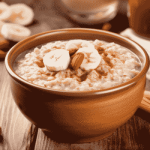Buttermilk, a tangy and refreshing beverage, has been a staple in various cultures for centuries. Traditionally, it was the liquid left after churning butter out of cream.
Today, most buttermilk consumed is cultured, meaning it’s made by adding lactic acid bacteria to regular milk, giving it that characteristic tang and thicker consistency.
But is buttermilk good for you? Let’s explore this popular drink’s nutritional value, health benefits, and potential downsides.
Quick Summary
Yes, buttermilk is good for you. It’s rich in probiotics and low in fat, and it can aid digestion, support gut health, and provide essential nutrients.
Do You Benefit from Buttermilk?
Here’s a step-by-step breakdown of why buttermilk is good for you:
Rich in Probiotics
Buttermilk contains probiotics, which are beneficial bacteria.
Probiotics support a healthy gut, improve digestion, and boost the immune system.
Low in Fat and Calories
Buttermilk is relatively low in fat and calories compared to other dairy products.
It’s a lighter option to help with weight management while providing essential nutrients.
High in Nutrients
Buttermilk is rich in vitamins and minerals, including calcium, vitamin B12, potassium, and phosphorus.
These nutrients are crucial for bone health, energy production, and fluid balance.
Easy to Digest
The fermentation process in buttermilk breaks down lactose and fat.
This makes buttermilk easier to digest, especially for those with mild lactose intolerance.
Supports Hydration
Buttermilk contains electrolytes like potassium and sodium.
It helps keep the body hydrated and is especially beneficial in hot weather.
Aids in Weight Loss
Buttermilk is filling and satisfying due to its protein content.
It can help you feel full longer, reducing the likelihood of overeating.
May Lower Blood Pressure
The peptides formed during the fermentation process can relax blood vessels.
This can contribute to lower blood pressure levels.
Nutritional Value of Buttermilk
Buttermilk is packed with essential nutrients that contribute to overall health. Here’s a breakdown of what you can find in a typical serving (1 cup, about 240 ml) of low-fat buttermilk:
- Calories: 99
- Protein: 8 grams
- Fat: 2 grams
- Carbohydrates: 12 grams
- Calcium: 28% of the Daily Value (DV)
- Vitamin B12: 22% of the DV
- Riboflavin (Vitamin B2): 24% of the DV
- Phosphorus: 20% of the DV
- Sodium: 16% of the DV
- Potassium: 14% of the DV
Buttermilk is also a source of probiotics, the beneficial bacteria that promote gut health. The nutritional content can vary depending on whether it’s made from full-fat, low-fat, or non-fat milk.
How to Incorporate Buttermilk into Your Diet?
There are many delicious and versatile ways to incorporate buttermilk into your daily routine. Here are some ideas to get you started:
Smoothies and Shakes: Add buttermilk to your favorite fruit or vegetable smoothies for a creamy, tangy boost of flavor and nutrients.
Baked Goods: Use buttermilk instead of regular milk when making pancakes, waffles, muffins, or biscuits for a tender, moist texture.
Marinades and Dressings: To add a tangy, creamy element, incorporate buttermilk into your marinades, dressings, or dips.
Soups and Stews: Use buttermilk to add richness and creaminess to your favorite soups, stews, or chowders.
Beverages: Buttermilk is a refreshing, probiotic-rich drink that can be consumed alone or mixed with fruit, herbs, or spices.
Potential Downsides of Buttermilk
While buttermilk offers numerous health benefits, it’s important to be aware of potential downsides:
Lactose Intolerance
Although the fermentation process in buttermilk reduces the lactose content, it’s not completely lactose-free.
People with severe lactose intolerance may still experience discomfort after consuming buttermilk. However, for those with mild intolerance, buttermilk is often easier to digest than regular milk.
Sodium Content
Buttermilk can be relatively high in sodium, especially if it’s store-bought and contains added salt. Excessive sodium intake can contribute to high blood pressure and other cardiovascular issues.
If you’re watching your salt intake, choosing low-sodium options or consuming buttermilk in moderation is important.
Allergies
Buttermilk is a dairy product that contains casein and whey proteins, which can trigger allergic reactions in individuals with milk allergies.
Symptoms may include hives, digestive issues, or more severe reactions. If you have a milk allergy, it’s best to avoid buttermilk.
Added Sugars and Preservatives
Some commercial buttermilk products may contain added sugars, flavorings, and preservatives. These additives can detract from the health benefits of buttermilk, leading to increased calorie intake and potential negative effects on health. Opt for plain, unsweetened buttermilk or make your own at home to avoid these.
How to Incorporate Buttermilk into Your Diet?
Buttermilk is a versatile ingredient that can be used in various ways:
As a Drink: Enjoy a chilled buttermilk, or add a pinch of salt, cumin, or fresh herbs for flavor.
In Smoothies: Blend buttermilk with fruits like berries or bananas for a creamy and nutritious smoothie.
In Baking: Buttermilk adds moisture and a slight tang to baked goods like pancakes, muffins, and biscuits.
In Dressings: Use buttermilk as a base for creamy salad dressings or dips.
In Cooking: Buttermilk can marinate meats, tenderize chicken, or add richness to soups and stews.
Conclusion
Buttermilk is indeed good for you. It offers many health benefits, from supporting digestive health to promoting strong bones and potentially aiding in weight loss. Its rich nutritional profile and low calorie and fat content make it an excellent addition to a balanced diet.
However, like any food, buttermilk should be consumed in moderation, especially if you’re watching your sodium intake or have lactose intolerance.
Whether you drink it on its own or incorporate it into your cooking, buttermilk is a delicious and nutritious option that can enhance your diet and health.



